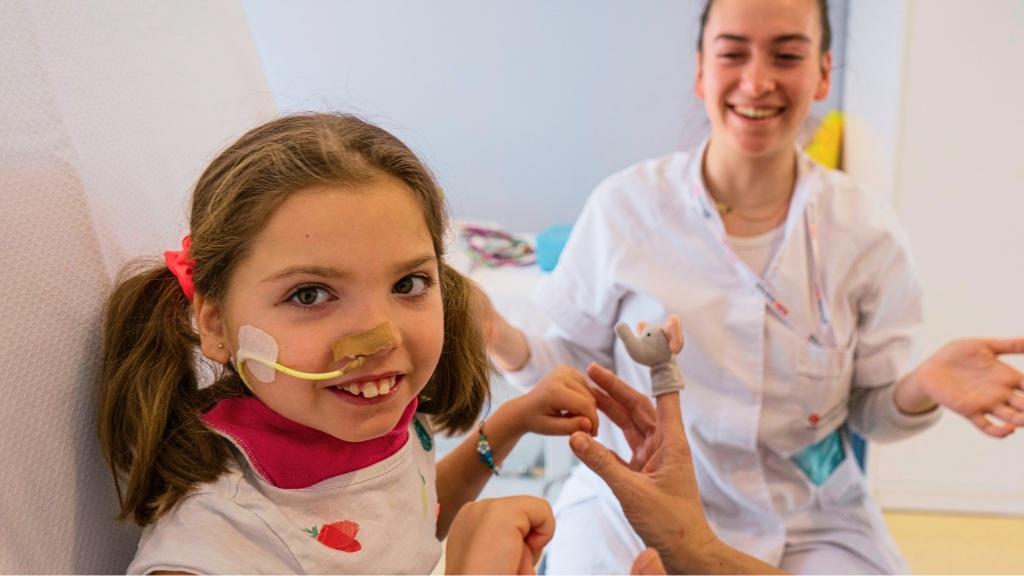
Paula's mother highlights the compassionate care she received at the intermediate care facility after her daughter—a patient with Rett syndrome—suffered complications from an influenza A infection.
Paula watches cartoons on her tablet as we interview her mother, Raquel. This 11-year-old girl, diagnosed with Rett syndrome at seven years old at the SJD Barcelona Children's Hospital, is on the final leg of her time at La Casa de Sofía. After an unstable autumn, in the middle of January 2024, the girl was admitted to the Pediatric Emergencies Department at the hospital with a very high fever. There, she was diagnosed with influenza A, metabolic acidosis and pneumonia.
This was the beginning of a long road for Paula, but thanks to the care she received at La Casa de Sofía, it was a lot easier for her and her family. Her mother, Raquel, tells us about her experience.
Raquel begins her story by explaining a little about how being admitted to hospital impacted her daughter. ‘For other kids, the flu isn't anything more than a fever and sore muscles, but Paula ended up developing very severe pneumonia. It was in the part of her lung that can't be reached with a puncture, and we ended up in the ICU.’ These conditions put the girl's health at risk.
Patients with Rett syndrome are used to having respiratory issues. In fact, Paula has always had them, but ever since having flu A and pneumonia, they have gotten worse. According to Raquel, this diagnosis was ‘a huge challenge. Now we have to cut up her food and use liquid thickener so she doesn't choke on it, as during her admission she was diagnosed with dysphagia.’
La Casa de Sofía: a resource for patients after admission to the ICU
After five days in the Pediatric ICU, the hospital team suggested transferring the girl to La Casa de Sofía so she could recover properly. The girl's mother remembers that ‘they said Paula would take a long time to recover because she had been really ill with the lung infection, so then they recommended we get transferred here.’
This did not come as a surprise to Raquel, who had already heard of La Casa de Sofía. ‘In a meeting with the Catalan Rett Syndrome Association, Jordi Cruz told us about the facility, as well as several music therapists and the Fundación Arte Paliativo [Palliative Art Foundation] who are involved with our association, who spoke very highly of it.’
A space for the entire family
Experiencing it first-hand, her time at La Casa de Sofía really helped Paula and her family were able to be with her without dealing with the hassles of long stays like at other types of hospitals. Raquel highlights that ‘we were all able to come here. My 13-year-old son came here from school every afternoon, we’d have lunch and dinner together, he had a place to do his homework, spend time with his sister, read and even play her a song on his guitar.’
Raquel also wanted to pay particular thanks to the respiratory physiotherapists who ‘helped Paula get rid of the excess mucous and, little by little, help her affected lung get better. They even gave us advice for how to look after her at home.’
The importance of the Hospital Amic programme
The patient's mother also emphasised the importance of the activities that are held in La Casa de Sofía, such as art therapy or music therapy. ‘They helped Paula a lot during her time here, as well as her brother and the whole family, so we could deal with everything that was happening during such a long admission. In our case, it was made worse because of another health issue, this time to do with my father.’
These spectacular efforts from all of the nursing and healthcare staff to make her comfortable, as well as the extra activities they ran, were a crucial part of Paula’s recovery. Raquel also remembers that her daughter was ‘very affected by her time in hospital, and after coming to La Casa de Sofía, little by little she became her old self again, always happy. My family has seen La Casa de Sofía as more of a temporary home than a hospital facility.’
The role of the Volunteering team is another aspect that Paula's mother really appreciated. ‘The volunteers come and take over to give you a moment to collect yourself and disconnect.’ Another positive aspect for her was being able to meet other families in similar situations of long admissions, which helped create relationships of mutual support, which are very positive to have.




